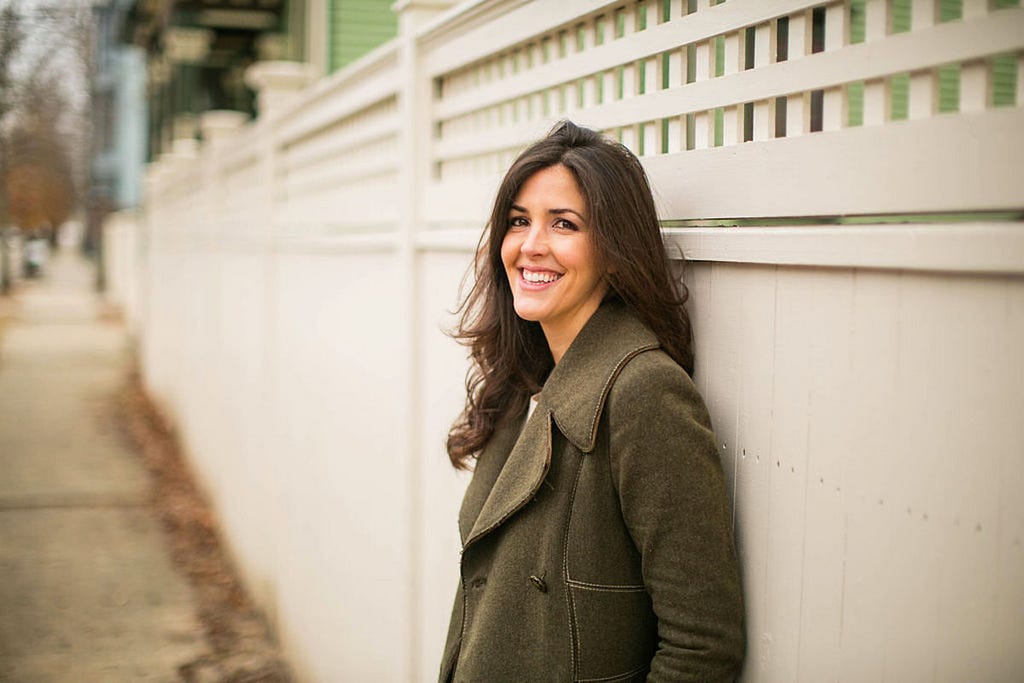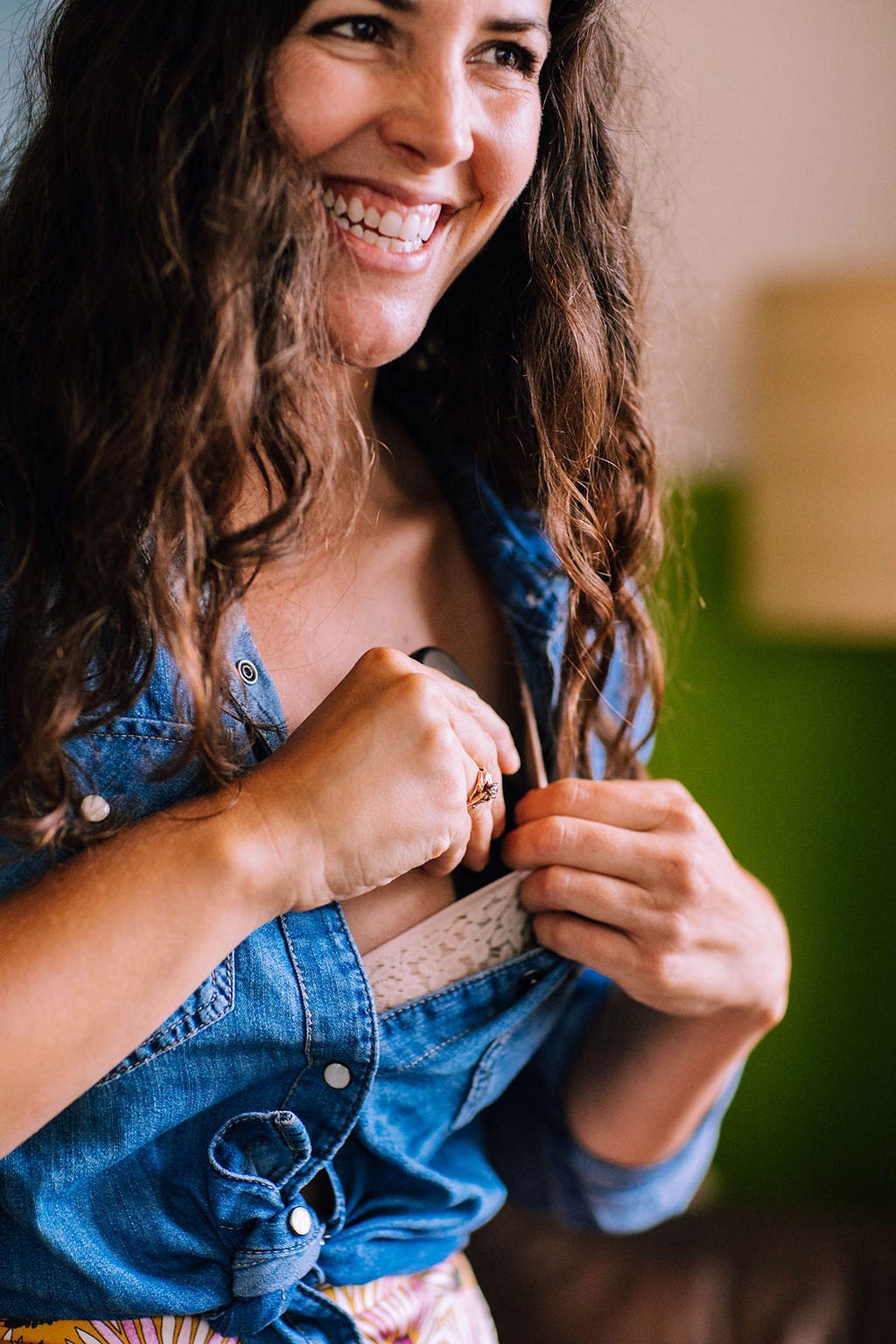Health Tech: Kristen Carbone On How Brilliantly’s Technology Can Make An Important Impact On Our Overall Wellness

Partner with other founders and companies that are mission aligned inside and outside of your space. Sharing ideas, best practices and brainstorming is valuable. I’ve joined a number of networking groups and founder communities (Dreamers & Doers, The Fourth Floor to name two) where I’ve found support, funding and other founders who’ve become my go-to confidants.
In recent years, Big Tech has gotten a bad rep. But of course many tech companies are doing important work making monumental positive changes to society, health, and the environment. To highlight these, we started a new interview series about “Technology Making An Important Positive Social Impact”. We are interviewing leaders of tech companies who are creating or have created a tech product that is helping to make a positive change in people’s lives or the environment. As a part of this series, I had the pleasure of interviewing Kristen Carbone, Founder and CEO of Brilliantly.
Kristen Carbone is committed to making the lives of the people around her more comfortable, fulfilling and beautiful. After a decade-long career working in curatorial departments in Museums across New York and New England she founded Brilliantly. A writer, public speaker, and solution finder, Kristen serves on the Advisory Council for the Breasties, and is a member of Dreamers & Doers, The Fourth Floor, Female Founders Community. In addition to her work at Brilliantly, Kristen is an avid jigsaw puzzler, gardener, and list maker. She currently resides in Providence, Rhode Island.
Thank you so much for joining us in this interview series. Before we dive in, our readers would love to learn a bit more about you. Can you tell us a bit about your childhood backstory and how you grew up?
I was born and raised just outside Buffalo, New York. I feel truly lucky to have grown up with two loving parents and an older brother. Having a safe and stable environment in my early life is the foundation for my ability to take big risks– like making a mid-career shift and starting Brilliantly. I attended public school until college, at which point my roommate told me that I was at our private college to “fill a quota of public school kids.” Since then, I’ve felt like I had something to prove. College was the first time that I started putting in effort to achieve goals. I graduated a year early and have continued to try and make my own path both personally and professionally ever since.
Can you share the most interesting story that happened to you since you began your career?
Starting Brilliantly was a total departure from my professional path, and starting over gave me the opportunity to meet so many new people. In early 2018, I attended a weekend-long event in the Poconos with a group of women in the breast cancer community. I drove 4 ½ hours alone in the car wondering the entire time if I was going to have the courage to walk in the door. When I pulled up to the house, I almost turned around and drove home. I felt absolutely crazy for thinking that going to a retreat with strangers could be fun. Instead of leaving, I took a deep breath, walked up to the front door and was greeted by a woman who is now one of the many friends I made that weekend; a number of whom have changed my life. That event is just one example of the hundreds of rooms I’ve walked into where I’ve had to take a deep breath and psych myself up first. Starting Brilliantly is a meditation in trying new things, learning new skills and meeting new people.
None of us are able to achieve success without some help along the way. Is there a particular person who you are grateful towards who helped get you to where you are? Can you share a story about that?
There are dozens of people who’ve helped realize Brilliantly. The one person who rarely gets accolades is my ex-husband, Brendon. Even though we are no longer married, we share two wonderful children and our life is very much intertwined. My decisions and my high-tolerance for risk affect him greatly. Brendon’s been an advocate for this effort from the very beginning and he not only takes over kid-duties when I leave town for fundraising meetings, but builds and maintains my website and fields all of my general tech questions (of which there are many). I wouldn’t have been able to do this without his support. Our relationship may not look how we imagined, but I am so grateful for him nonetheless.
Can you please give us your favorite “Life Lesson Quote”? Can you share how that was relevant to you in your life?
There’s a Gloria Steinem quote about living out the un-lived lives of our mothers that resonates with me. In my case, the meaning is two-fold. There’s of course the feminist interpretation of what Steinem said, but because my mother died young, I feel a pressure and urgency to experience everything I possibly can for myself but also for her.

You are a successful business leader. Which three character traits do you think were most instrumental to your success? Can you please share a story or example for each?
First, I am relentlessly optimistic. I have learned to focus on what’s possible and why things will work rather than focusing on limitations. Without optimism, I probably wouldn’t have started this business at all. My background in the arts didn’t naturally lend itself to founding a tech company.
My optimism is tempered by a healthy dose of fear. I am a little afraid every single day, and what about varies from supply chain to fundraising to my preparedness before a speaking event. When I’m feeling afraid I try to take a minute and breathe. Sometimes I have quite literally a single minute before something starts to try and relax. I’ll sit at my desk before a pitch, close my eyes, take a big, deep breath and remind myself it’s going to be fine. If I’ve got a few more minutes, I like listening to a song that makes me feel good.
With practice, I’ve become someone who is quick to laugh. Finding humor in the difficult moments has helped me remain emotionally well.
Ok super. Let’s now shift to the main part of our discussion about the tech tools that you are helping to create that can make a positive impact on our wellness. To begin, which particular problems are you aiming to solve?
Brilliantly started with trying to solve a problem for myself. My mother Lisa died from metastatic breast cancer at age 49, and after years of expensive and emotionally taxing screenings, finding a lump, and learning more about my hereditary risk, I had a preventative mastectomy and reconstruction in 2013. In the years following, I faced a profound shift in my identity and connection with my body. One of the unexpected things that bothered me was feeling constantly cold. Turned out, I wasn’t the only one dealing with this relatively common result of implant reconstruction. After countless failed attempts to jerry-rig something, I set my mind on designing a sustainable solution to help women like myself feel physically better.
How do you think your technology can address this?
I’m delighted to share that after years of R&D and user testing and a pandemic, that we launched Brilliantly Warm. It’s a science-backed, smartphone-enabled wearable device that slips easily into any bra.
Using technology was the perfect way to solve this problem because Brilliantly Warm gives women freedom– they can wear any outfit, they can focus on what’s important in a given moment instead of their discomfort all while controlling their personal temperature right from their phone.
Can you tell us the backstory about what inspired you to originally feel passionate about this cause?
Well, as I mentioned before, I had been dealing with the problem myself and connecting with so many other women who also had this issue motivated me to try and solve it. Over time, I’ve only become more passionate about my commitment to making people more comfortable. Since our product launch last summer, 25% of our orders have been from women outside of the breast cancer community. It turns out, women are using Brilliantly Warm not only because of chronic health-related conditions, but because they’re tired of sitting at their desk bundled up at work or simply love it for outdoor activities like skiing or running. Nursing moms love Brilliantly Warm too and report that it helps ease discomfort and aids with let down. We even have users who put brilliantly warm in their pants when they have menstrual cramps. It’s easy to be passionate about helping so many people.
How do you think this might change the world?
When I think about the biggest possible future for my patent-pending technology I imagine it as the go-to product for controlling one’s personal temperature. Because it’s not part of a specific garment, anyone can use it. Imagine if we could all be at just the right level of warmth in a space and not need to heat entire rooms, homes, office buildings to an ideal temperature. It would reduce costs and have a positive impact on the environment.
Keeping “Black Mirror” and the “Law of Unintended Consequences” in mind, can you see any potential drawbacks about this technology that people should think more deeply about?
One of the things that I think about pretty regularly is the economic concern around technology in general. My idea of us being able to control our personal temperature is inherently elitist because there will of course be people who can’t afford wearable technology.
Here is the main question for our discussion. Based on your experience and success, can you please share “Five things you need to know to successfully create technology that can make a positive social impact”? (Please share a story or an example, for each.)
1. Confirm product market fit. It’s absolutely critical to talk to the people who will use your product or service before you create it. Understand their problem, how they currently solve it and then honestly assess if your idea is an improvement. That’s important for anyone starting a business and especially so if you’re looking to create social impact. I talked to hundreds of women before I started designing Brilliantly Warm and realized that the impact I wanted to make was simple- helping a couple stop fighting about the thermostat settings or warm an office worker so she could do better, more focused work.
2. If you have a business idea that requires outside funding, making sure your investors are mission aligned and social impact-minded is critical. I’ve turned down money from investors, in a moment when I really needed capital, who I knew would force me to make decisions that didn’t align with my mission.
3. If you’re creating a physical product, think about the full product life cycle. Where do the raw materials come from, where is the product manufactured, what do you ship it in, what happens when the product is obsolete and no longer useful? While I know I have a lot of work to do on that front, I made the decision to manufacture in the US and to ship in all recyclable materials. I’m looking forward to a future where we can do even better on this!
4. Work with engineers and designers who are already social impact-minded. If your team already thinks about solutions through a socially responsible lens, you’ll be one step ahead right from the beginning. When we were designing the app that controls Brilliantly Warm, my amazing designer reminded me that I needed to make sure that the visuals were ADA compliant.
5. Lastly, partner with other founders and companies that are mission aligned inside and outside of your space. Sharing ideas, best practices and brainstorming is valuable. I’ve joined a number of networking groups and founder communities (Dreamers & Doers, The Fourth Floor to name two) where I’ve found support, funding and other founders who’ve become my go-to confidants.
If you could tell other young people one thing about why they should consider making a positive impact on our environment or society, like you, what would you tell them?
I am excited that this younger generation finally seems to know that this is it. This is the only planet we have and that we need to have companies and policies that protect it. When I imagine the future of startups, I sort of hope that there’s an ethics committee of sorts that weighs the cost vs. benefit of a particular business before it starts. I’m just not sure why any business should start that doesn’t have the health of our environment or culture in mind. I would tell any young person thinking about starting a business to make sure that social impact is one of the core tenants.
Is there a person in the world, or in the US with whom you would like to have a private breakfast or lunch, and why? He or she might just see this, especially if we tag them. 🙂
In a previous interview, I said Tim Ferris because his book, The Four Hour Work Week, completely changed how I thought about my time. I used his Four Hour Body plan after my daughter was born a couple of years later to drop my baby weight and get my BMI back to where my oncologist recommends. And when I started Brilliantly, one of my dear friends sent me Tribe of Mentors. It’s highlighted and dog-eared and I return to it for inspiration regularly. I love his no-bullshit approach to solving problems and think he’s a wonderful interviewer. I would love an opportunity to talk with him.
How can our readers further follow your work online?
First, joining our mailing list is the best way to hear the latest news about Brilliantly. We’re also active on Instagram, Facebook, LinkedIn, Pinterest and Twitter. And, if you want to get in touch directly, please send an email to [email protected] I just love connecting with new people.
Thank you so much for joining us. This was very inspirational, and we wish you continued success in your important work.
Health Tech: Kristen Carbone On How Brilliantly’s Technology Can Make An Important Impact On Our… was originally published in Authority Magazine on Medium, where people are continuing the conversation by highlighting and responding to this story.
